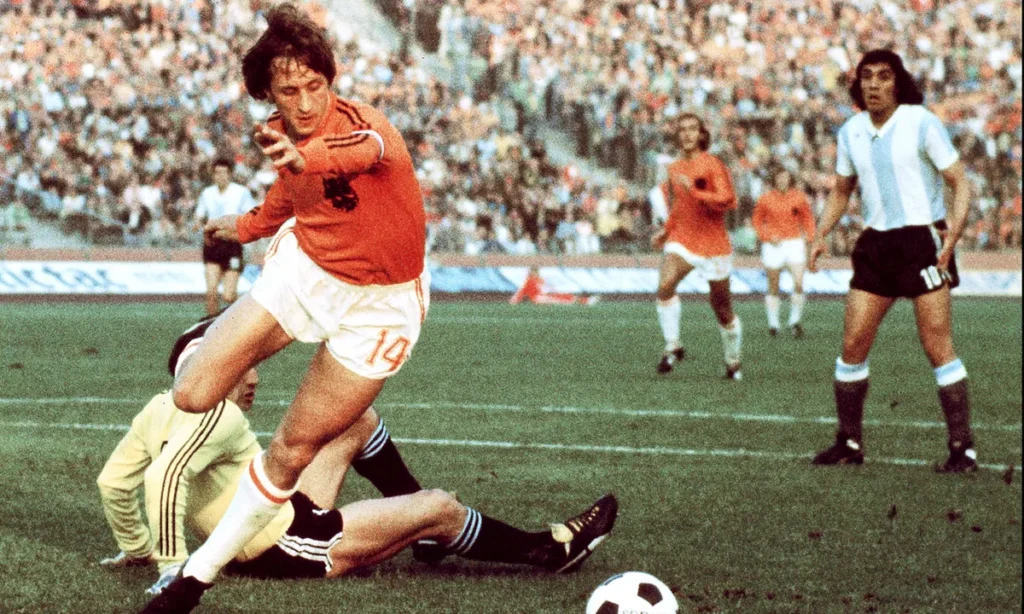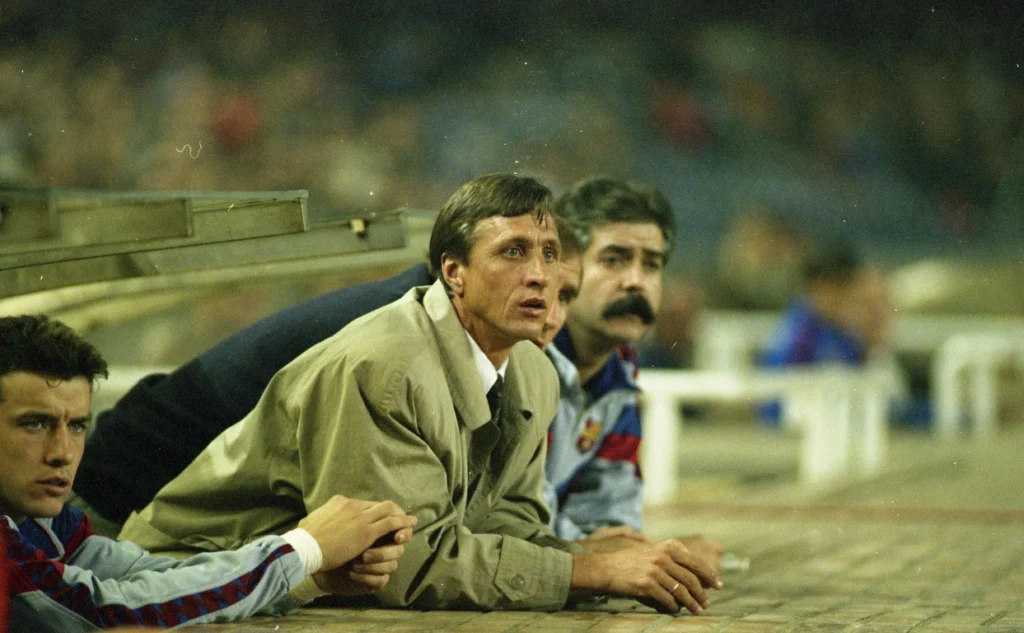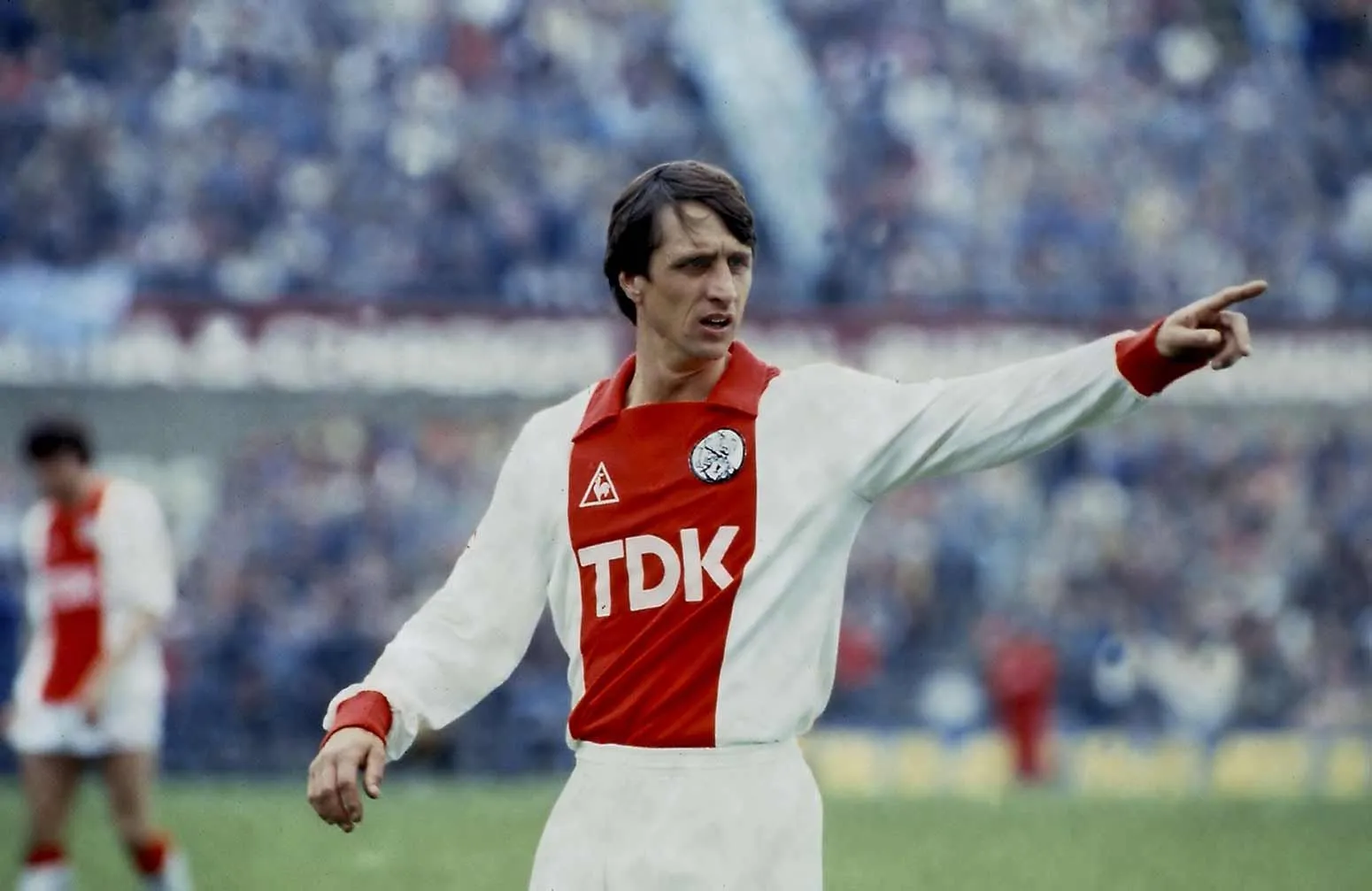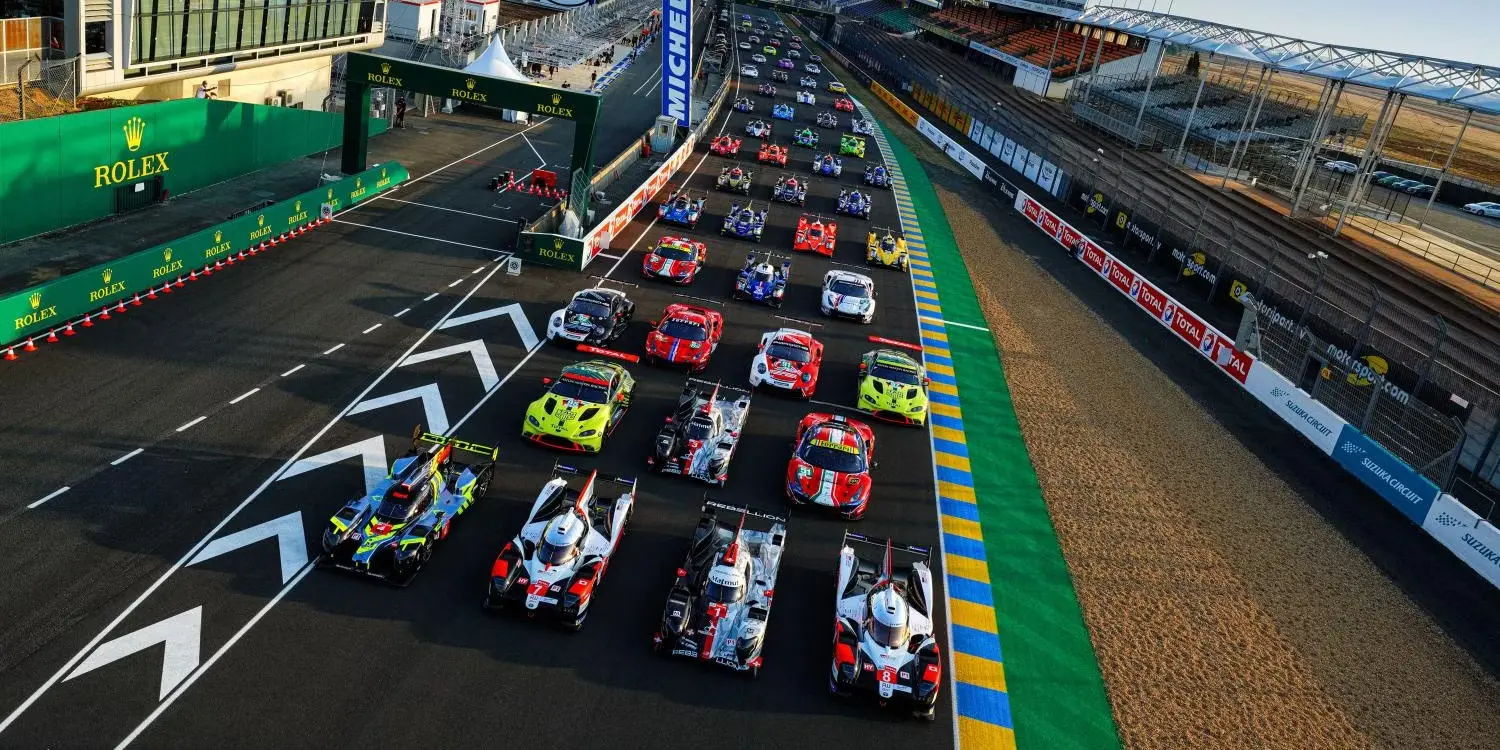The world of football is ever-changing with sacrosanct moments which change the course of it forever. And one such milestone was the tactical revolution called Total Football. Developed and promoted by the iconic Johan Cruyff, this new philosophy would change not only how football was played but also coached and understood.
Fundamentally, Total Football is a fluid tactical system that promotes interchangeable positioning and collective player responsibilities. Players in a Total Football system are taught to be more flexible, moving around the pitch much more freely than some of their counterparts who prefer rigid assignments and instructions. This fluidity ensures they are able to keep the ball, create chances and press effectively off it – a very powerful style of football.
Total Football is unique in that it transcends the normal boundaries of soccer. It bets back against the common idea of roles, where every player has some capacity that they must bend themselves to. Rather, Total Football requires multi-faceted players who can continually evolve and meet the needs of a fluid match. This fast, skill based and truly unpredictable mode brings out the best type of gameplay Call of Duty has to offer.
The Legacy of Total Football
Total Football was the concept that changed football forever. This transformative front-foot style of play moved the game forward and has been stitched into football forever, dictating a seismic shift in how much of what we know about playing, coaching or perceiving this sport.
Modern teams played in a manner that attempted to give an impression as it can transform the way regular football play is approach. Total Football deconstructs many traditional conventions of team sport by prioritizing smooth movement, positional interchangeability and collective responsibility over the more rigid hierarchical ways of organizing a squad. In a sense, players are freed from their particular roles to do as they choose and create within the team dynamic. This change in perspective results has produced a more flexible and resilient style of play, ensuring teams are better placed to deal with the challenges that an evolving game presents.
Furthermore, it directly contributed the expansion of several players. Total Football vs Modern Day Tactics This approach to strategy places less emphasis on specialization and more focus instead goes into developing all-rounded players, able to play a variety of roles in the field. It is a more joined-up, 360-degree player-development process that has grown what seems to be a generation of footballers with technical excellence at the core but tactical nous in every sinew. These players mean that changes of position do not appear to have any effect as some may be uncomfortable changing it, whereas these can play in nearly every position with no troubles.
It has influenced not just on the field (it transformed coaching and analysis as well). For coaches guided by this philosophy, understanding the principles of the game and creating working teams is essential. In turn, that has created a new breed of tactical innovators constantly searching for ways to perfect and evolve the Total Football method. In a similar fashion, the proprietary analytical tools and metrics used to evaluate team performance – or individual player qualities heretofore thought unquantifiable-needed refinement as well in order to properly grasp this fluid style of play.

The influence of Johan Cruyff in the evolution of Total Football
The revolutionary figure at the battlefront of Total Football was none other than Johan Cruyff. Cruyff epitomised this new style, as both a player and manager in the game his tactics have made him one of the most influential figures ever to be involved with football.
Highly regarded as a player in his own right, Cruyff was an artist on the field and praised for his dribbling skills not to mention versatility between positions. He was the perfect Total Football player, able to be deployed in any outfield position and tailor his game to suit the requirements of that particular contest. It was also shaped by the first chapter in his life: Cruyff’s brilliance on a football field had been as much about Total Football, an understanding of how things should be and why.
But it was as a manager that the Cruyff legacy came into its own. He led Ajax and Barcelona into their most successful periods, bringing a change to the Total Football approach that made both clubs dominant forces not only in domestic leagues but also on the European stage. Cruyff’s sides set the standard for how to play football gorgeously with flair, butsusting energy and relentless pressuring of opponents.
The importance of Cruyff went even beyond the tactics. A visionary thinker, he was also ahead of time in realizing the importance behind player development and creating a unique playing brand. Thanks to his coaching, Ajax and Barcelona both established elite levels of football schooling which produced multiple generations of players instilled with the philosophy that defined Total Football. But these were not only very talented youngsters in a technical sense, they had also great insights into the game on tactical level – allowing them to cooperate with Cruyff’s play systems.
Johan Cruyff’s Total Football changed the game forever. His ideas and philosophies have since been widely accepted by coaches (coaches all over the world) as well as countless individual teams, that path has in turn defined how football is played currently. The legacy of Cruyff as one the game’s most significant ever revolutionary figures has remained intact.
Total Football Key Tenets
The philosophy of Total Football is built on a core set of principles which have underpinned its game-changing style. This is the established methodology of play, a model skillfully designed and moulded by Johan Cruyff Clubs methods respond to this theory for player development in style & results fostering bold tacticians with audacious scheming across both players + coaches empowering all adherents towards tactical marksmanship:
The basic foundation of Total Football, the earliest principle in particular. This means no one player is tied down to a certain role or position on the field; and in fact, players are expected to constantly transition between defending and attacking (as well as across the park). This variance consistently shifts personnel, making it difficult to predict or rotate defensively. It also results in decision making on both ends of the field: when does a center back step into possession while attacking (and for how long) and which defenders are otherwise left forward so that they might press the opposition themselves?
The idea of positional interchangeability is similar to the concept of collective responsibility. In a Total Football system, every player will be required to play as both an attacker and defender. Everything in the game is designed around this collective angle, which means you ideally ought to know what your pals are doing at all times- so you can play correctly for them. This level of unanimous understanding and action is critical to the success for Total Football.
Possession and Ball Control The other principle of Total Football is their focus on possession. Cruyff argued that the more you have possession of a ball, the fewer opportunities your opponent has to score. So apparently, all focus in El Masia was already about possesion-based football and players learn how to take the ball properly in right way -confidence with MCD but they gonna find out Picture B is more important area tfrom which you have shoot better. Total Football is characterized by its emphasis on the retention of possession and dominant control over everything that occurs in a game.
The principle of pressing is also a key part of the Total Football philosophical framework, aggressive pressing. Upon losing the ball, players are to press aggressively in an attempt to win back possession immediately. Not only does this high-intensity pressing break up the rhythm of the opponent but it allows gaps to created in mid field-line for counter attacks and quick turnover moments. The fact that it takes a team of players working as one to apply proper pressure underscores the tenet around teamwork in Total Football.
On this article, we will delve into the core principles of Weinhold’s ‘Total Football’: positional interchangeability, collective responsibility — and “all for one” mentality at its heart—- balanced possession-based football through smart use of Forrest Gump’s momma (flank run), and enhanced by a high-risk higher reward pressing scheme. Teams and players have found a way to revolutionize the game, captivating audiences, starting from mastering these principles.
Legend Matches and Notable Teams Who Played Total Football
The impacts of total football has been reflected by the performances and seens from some of epitome teams & therabouts games in soccer history. This is not only confirmation of the game’s most forward-thinking system working very well but also how Johan Cruyff came up with a blueprint that will live forever.
An iconic exhibit of Total Football in practice, however, is the Dutch national team at that 1974 FIFA World Cup. And in the hands of a peerless Johan Cruyff – led team, they engaged in displays of skill and tactical mastery that had never been seen before. Their game against Argentina in particular demonstrated how it could be used to great effect, with a Dutch team boasting what would become City’s own Kryptonite -kocofootball similar relentless pressing and intricate passing- cutting swathes through their recalcitrant defense.
One of the more iconic examples of Total Football is Pep Guardiola’s dominant late 2000s and early 2010s Barcelona team. A follower of Cruyffian theories, Guardiola spearheaded a style shortly labelled “Tiki-Taka”, an extension of Total Football. Barcelona went on to collect a host of titles and win the hearts of audiences across Europe with their ball possession-based, high pressing style.
Arguably the legendary Ajax teams of the 1970s, including coach Rinus Michels and with players as Johan Cruyff, Ruud Krol or Johnny Rep among others. These teams epitomised movement, positions shared liberally and responsibility for collective results, redefined the game as a whole effectively introducing apolitical sided football fans to an allnew brand of Modern Football. Their success in European competition – their three successive victories over the Kings of Europe — helped solidify Cruyff and Rinus Michels’sapproach to football.
More recently, the Spanish national team’s dominance between 2008 and 2012 (they won two Euro Championships as well as a World Cup during this period) may be viewed in those terms of Total Football. Their possession-based, intricate passing and collective pressing shared a spiritual bond with the tactical approach touted by Cruyff – an indication of his revolutionary philosophy continuing to pervade through the modern game.
These are just a few of the examples which show how big an influence Total Football has had on football. Those teams and those games which have done this not only experienced great feats of success, they also managed to do so in an aesthetically imposing and refreshing manner that has wow-ed audiences. TotalFootballing and its legacy continues to affect the modern game today, serving as both a beacon of inspiration for coaches looking to create unique ideas in their own system, but also a reminder that there is always new ground we can cover about how great football – like jazz music or interpretive dance routines – truly functions.

Back in the Netherlands, with Total Football and Johan Cruyff
The Total Football era of Johan Cruyff’s legacy was because he tried and missed so many times throughout the proceeding years. The influence of this vision does not end with his own career but extends to the development and careers of countless coaches, players and even change in game itself.
Perhaps as important an element of Cruyff’s legacy is the impact his ideas had on the development of football in coaching and tactical terms. The instruction from Cruyff has left an indelible mark on a new breed of coaches who have looked to articulate and advance his ideals in the areas that he valued so greatly; fluid movements, positional freedom and collective responsibility. How they have revolutionised football, taking the Total Football philosophy from the days of Rinus Michels and Johan Cruyff to new levels-creating systems that not only wins matches but entertained fans too.
Furthermore, the impact Cruyff has left on how players are grown is immense. Total Football – focusing on versatility and adaptability, Total Footballes are encouraged to be the most “complete” players they can possibly become so that they will always be ready offer their services for different positions. Unsurprisingly it has yielded some of the brightest talents to this country with an ability not just be able do things but also know why you’re doing them in a tactical sense. These players are children of the Total Football ethos and have since become some of the biggest figures to grace our sport.
Even the analytical and evaluative legacy of Johan Cruyff alongside Total Football can be realized via this game. Analytical tools and metrics that examine team performance, player quality have changed to represent these dynamics characteristics of play. Key performance indicators such as possession, passing accuracy and pressing intensity are now the standard measures by which we judge a team’s approach to tactical problem solving – proof that Cruyff’s ideas have lasting consequences.
Cruyffs cultural and philosophical impact goes way beyond the tactics or analytics of football. The importance of nurturing talent His focus on youth players, the establishment and maintenance a clear footballing identity and growing up academy pros have all instigated changes in how soccer is seen. The Johan Cruyff Institute, the world renowned centre for education in Sports Management and Coaching is testament to his drive to influence how football should develop its future professionals.
The legacy of Johan Cruyff and Total Football is a testimony to how innovation & vision can change the world of football. Cruyff’s philosophies have changed the way football has been played and influenced numerous managers, players and supporters in taking up a new dynamic style of play for this beloved game. And in an ever-changing sport, the tenets of Total Football will ebb and flow with the tides of time but remain a foundation for years to come, ensuring Cruyff’s indelible mark on football continues well after today.
The Impact of Total Football on Coaching and Playing Styles
The legacy of Johan Cruyff’s Total Football philosophy is evident – not only in the tactical approaches to football, but also reaching its tentacles into how we coach and play the game today at all levels from a very young age through to top professional leagues.
The player development and unique playing style were two of the most prominent legacies that Total Football would provide on how coaching should be carried out. For Cruyff, the game was about so much more than winning games; it was a blueprint that generated footballers who epitomised Total Football. Ingraining tactical development, versatility and a holistic view of all skills-attributes inherent with the Total Football philosophy has opened coaches’ eyes to take similar mindsets towards player development.
Consequently, some of the best clubs and national teams in the world have developed famous youth academies based on this concept of Total Football. The development of such academies, that three decades ago would be alien to the footballing world (Ajax and Barcelona were in their infancy but even then sported advanced youth systems; Netherlands had none essentially), means there is a constant conveyor belt, with Ajax elevating the next crop of graduates schooled up on tactical acumen first while ball at feet can do all else necessary. The longevity of Cruyff’s ideas in the construction youngsters stars can also be seen through success at several academies that have named themselves after him, and yielded numerous talents.
Equally significant was the impact of wdbos on styles of play. This tactic encourages fluidity, an attacking roation within the more traditional forward shapes and a collective responsibility all of which nurtures flexibility in players behaviour on multiple fronts to adjust their game according to match situations. This variety has made a highly desirable trait, with attacking systems becoming more and more dynamic – or as is often the case in modern football. So teams can overload their opponents just by being able to play different tactical concepts.
Furthermore, this as it was leading to encouraging individual skill-sets that combines technical level with awareness and some athletic abilities. Total Football is looking for complete football players. This all-around plan in the development of players has yielded a brand footballer who is more than just adept at handling and creating moves, but they also have defensive nous and pressing intensity that defines the modern game. This is a trait of the Total Football player, giving them that incredible flexibility to fulfil both their defensive and offensive responsibilities with perfect ease.
Total Football also impacted the analyses and tactics of football. An increased focus on possession, passing and pressing has seen a new breed of metrics evolve to analyse how teams approach the game in increasingly focused ways. As coaches and analysts have gone deeper into the complexities of Total Football, we are only just starting to understand how can teams be fine-tuned systems which provide competitive edges over their opponents. It is the continuous evolution and polishing up of the Total Football style that has kept its relevance in football, as it evolved along with all other aspects of one beautiful game.
Criticism and Problems Associated with Total Football
There is no way to deny the influence of Johan Cruyff’s Total Football on football as a whole, but there have been many critiques and hurdles for this revolutionary idea throughout history.
A key criticism of Total Football is that it supposedly forgets the solid and defend. The focus on fluidity in and out of possession, positional rotations and aggressive pressing often results in teams becoming vulnerable for the counter-attack or long-ball over the top due to players getting caught up field or struggling being involved with several attacking movements. As a result, some coaches have looked to adapt the Total Football blueprint by focussing on creating an equilibrium between attacking showmanship and defensive stability.
One of the biggest challenges that teams who play Total Football face is players need to have a high level of coordination and understanding. Being able to vacillate between offensive and defensive responsibilities with the ability of reading each other’s movements, while still being on a string – consequentially demanding an unmatch degree of teamwork. This collective understanding can take time to develop while singularity of brilliance may hamper the spread between members.
The requirements of Total Football in terms physicality have also been controversial. It is reliant on high-pressing, relentless running and positional fluidity which can take its toll on players both in terms of trauma & fatigue. With a long season in place, one of the requirements for teams to adapt this Total Football style is good management and recovery around player workloads.
Also read: Lockheed F-104 Starfighter: Versatile Supersonic Fighter Jet




